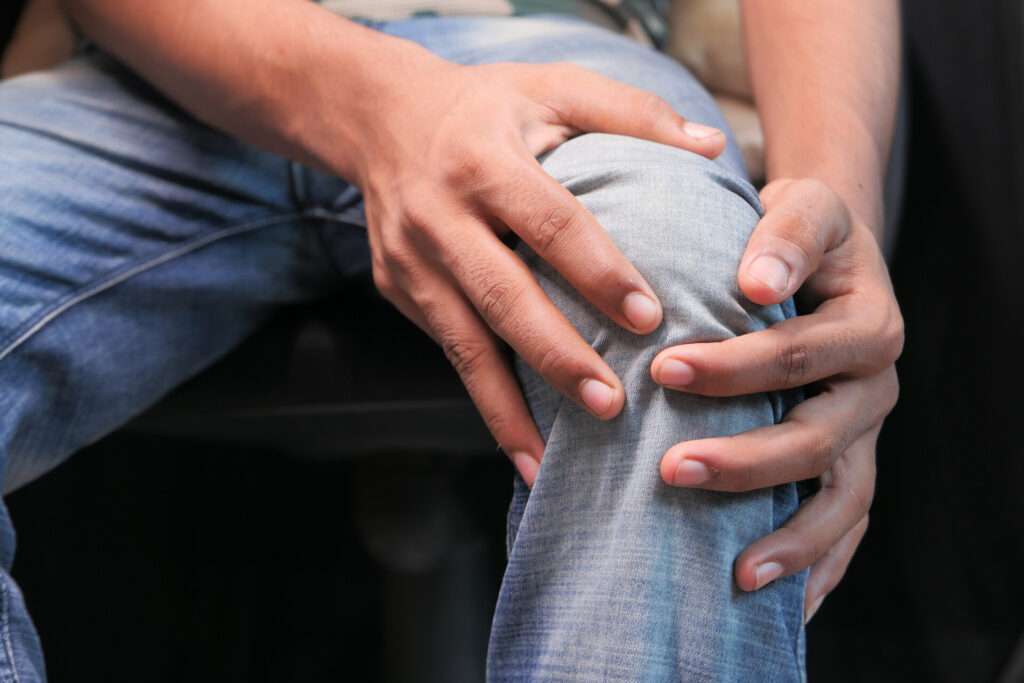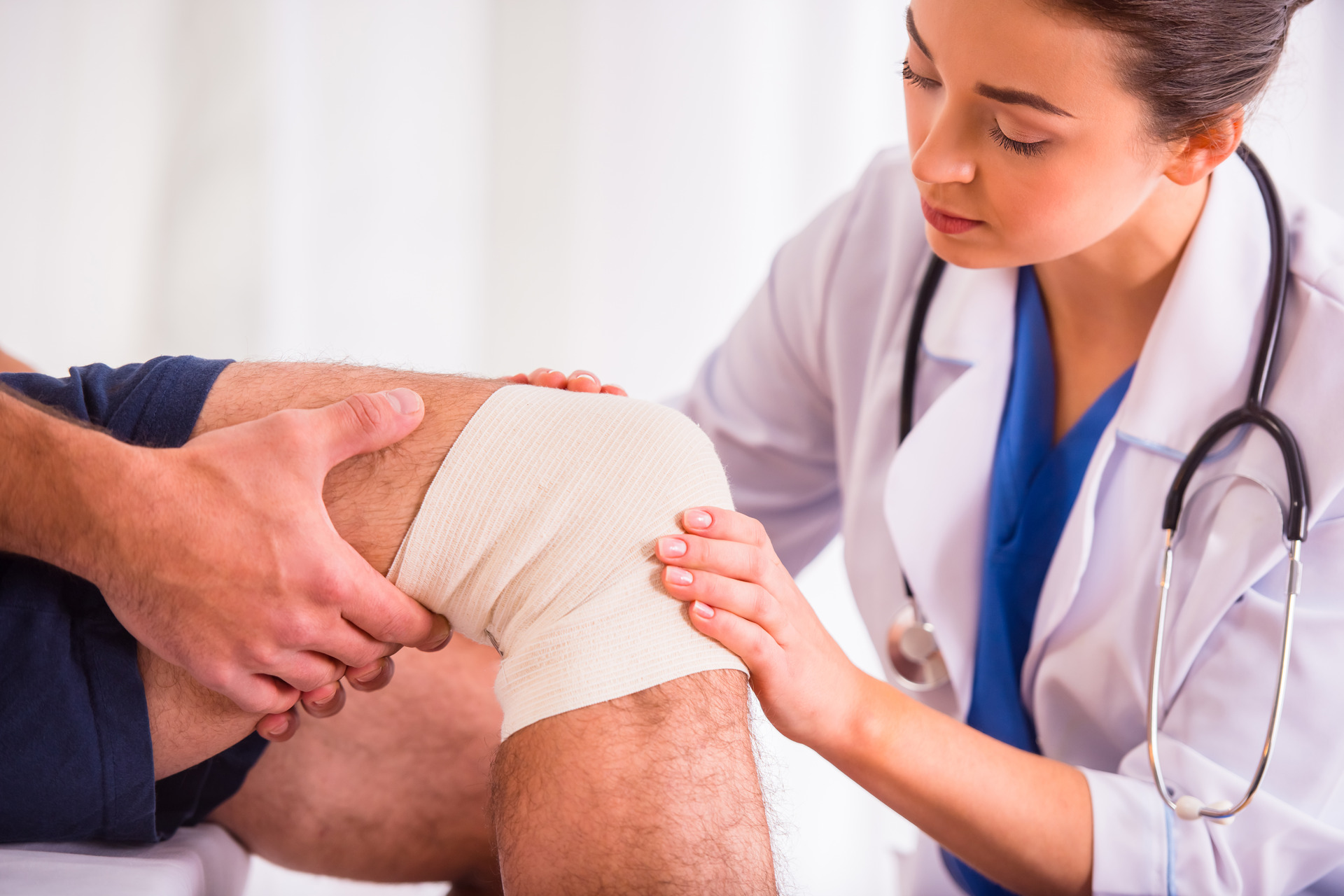Knee injuries are a common consequence of car accidents, often resulting from the forceful impact sustained during collisions. In Texas, the prevalence of such injuries is significant, given the state’s high rate of traffic incidents.
After a car accident, immediate medical attention is essential—knee injuries like ligament tears, fractures, or cartilage damage may not be obvious at first but can lead to serious mobility issues if left untreated. Seeking legal guidance can also be essential, ensuring you receive full compensation for medical bills, lost income, and long-term suffering.
At Keith & Lorfing, our team brings over 100 years of combined experience, 500 trials, and a reputation as Abilene’s Best Lawyers in 2023. We’ve built our firm by hiring only the most skilled and credentialed attorneys, giving our clients the aggressive representation needed to take on insurance companies and win big.

If you’ve sustained a knee injury from a car accident in Texas, contact our Abilene car accident lawyer today for a free consultation to discuss your options.
Who is Liable For Your Knee Injury?
Determining fault in a car crash is essential in a knee injury case, as Texas follows a comparative negligence rule. This means you can still recover damages if you are less than 51% at fault.
Liability often falls on:
- Reckless or negligent drivers who caused the crash by speeding, distracted driving, or ignoring traffic laws
- Failure to yield accidents where another driver ignored right-of-way rules, leading to knee and leg injuries
- DUI cases, where an intoxicated driver’s actions directly resulted in a knee injury sustained in a car accident
- Motorcycle accidents, which often lead to severe knee injuries due to direct impact with the road
Compensation You May Be Entitled To
The settlement amount depends on the severity of the injury and its impact on daily life. Accident victims may be entitled to:
- Medical bills for emergency treatment, surgeries, physical therapy, and future care for injuries like knee fractures, torn meniscus, or ligament damage
- Lost wages and reduced earning capacity if the injury affects your ability to work
- Pain and suffering, including chronic knee pain, limited mobility, and emotional distress
- Permanent disability compensation for lasting damage such as a knee dislocation, knee cap fracture, or ligament tears in the knee joint
How Insurance Companies Handle Knee Injury Claims
Insurance companies often try to minimize payouts for car accident injuries, especially when it comes to common knee injuries. They may argue that:
- The injury sustained in a car accident was a pre-existing condition rather than caused by the crash
- The knee contusion, ligament tear, or fracture is a minor injury rather than a severe injury
- The treatment or surgery needed is excessive or unrelated to the accident

Steps to Take After a Car Accident Knee Injury
If you suffer a knee injury sustained in a car accident, take the following actions:
- Seek medical attention immediately: A doctor can assess damage to the knee ligaments, such as the anterior cruciate ligament, medial collateral ligament, or lateral collateral ligament. Some knee injuries occur without immediate pain, so getting checked is important.
- Document injuries and medical treatments: Keep records of X-rays, MRIs, and surgical reports to support your injury case. Detailed documentation strengthens claims for injury verdicts and settlements.
- Gather evidence from the accident scene: Take photos of the dashboard or steering wheel impact, vehicle damage, and road conditions. Collect witness statements to establish fault, as injuries may result from reckless or negligent driving.
- Avoid giving statements to insurance companies without legal guidance: Insurers often minimize claims, arguing that the injuries include pre-existing conditions or that treatment is unnecessary. Let our attorney handle communications to prevent undervaluation.
- Contact our Texas personal injury lawyers for a free consultation: Our legal support will help you recover damages for knee injuries sustained in a car accident, including long-term care for ligament tears, fractures, or mobility issues.
- Consult our lawyer if: The injury results in surgery or long-term treatment, such as physical therapy for a torn anterior cruciate ligament or the insurance company denies or undervalues the claim, despite medical proof. Also, in situation where liability is disputed, and the common causes of the accident are unclear
Acting quickly is required. In Texas, injury claims must be filed within two years from the date of the accident. Getting legal representation ensures you have the best chance at securing a fair settlement.
Insurance companies may downplay your injuries. Protect your rights by speaking with our experienced West Texas personal injury lawyer before accepting any settlement.
Common Types of Knee Injuries from Car Accidents
Knee injuries are common in car accidents, especially when the dashboard, steering wheel, or seat impact causes sudden trauma to the ligaments in the knee, kneecap, or cartilage. The severity of these injuries can vary, ranging from soft tissue inflammation to fractures requiring surgery.
Below is a breakdown of the most common knee injuries sustained in a crash.
| Injury Type | Cause | Symptoms | Treatment |
|---|---|---|---|
| Dashboard Knee Injury (PCL Injury) | Caused by the knee forcefully hitting the dashboard during impact | Swelling, pain, instability, difficulty bending the knee | Physical therapy, bracing, or surgery in severe cases |
| ACL, MCL, & PCL Tears | Sudden twisting motion or direct impact to the knee | Swelling, popping sounds, severe pain, instability | Immobilization, physical therapy, or reconstructive surgery |
| Meniscus Tear | Cartilage damage from impact or unnatural twisting | Clicking sounds, swelling, limited range of motion | Rest, ice, physical therapy, and sometimes surgery |
| Kneecap Fractures & Dislocations | Direct impact causing fractures or displacement | Severe pain, visible deformity, difficulty walking | Immobilization, surgery, and pain management |
| Soft Tissue Injuries & Bursitis | Inflammation or bruising from trauma to the knee | Tenderness, swelling, difficulty moving the knee | RICE (Rest, Ice, Compression, Elevation), pain management |
⚠️ Car accidents can cause serious knee injuries that may require long-term treatment or surgical intervention. If you are experiencing pain in the knee after a crash, seeking immediate medical attention can prevent further complications and help with your personal injury case.

Symptoms Indicating a Serious Knee Injury
Adrenaline can mask pain, causing some symptoms to develop hours or even days later. If left untreated, injuries like ligament tears, fractures, or cartilage damage can lead to long-term mobility issues, chronic pain, or even permanent disability.
- Severe pain or swelling: Persistent pain and inflammation may indicate damage to the knee joint, ligaments, or soft tissues. If swelling worsens instead of improving, it could be a sign of internal bleeding or severe tissue damage.
- Difficulty bending or straightening the knee: If the knee feels stiff or locks up, it could mean cartilage damage, ligament tears, or fluid buildup in the joint. Limited movement can worsen over time without proper medical intervention.
- Popping or grinding sounds: A loud pop at the time of impact often signals a torn ACL, MCL, or meniscus. Grinding sensations while moving the knee could point to cartilage damage or early arthritis caused by the accident.
- Weakness or instability: If the knee feels like it may “give out” while walking or standing, it’s often due to ligament tears or nerve injuries. This instability can increase the risk of further damage or falls.
- Bruising or discoloration: Deep bruising around the knee cap, shin, or thigh suggests internal bleeding or blunt force trauma. Significant discoloration could be a sign of a fracture or torn ligament sustained in the accident.
- Limited range of motion: If it becomes difficult or painful to bend or straighten the knee fully, it may indicate a torn meniscus, fluid buildup, or swelling from severe joint damage.
Hypothetical Scenario: After being rear-ended at a stoplight, a driver initially felt fine but noticed mild knee stiffness later that night. Within 24 hours, the knee swelled significantly, and bending it became painful. A medical exam confirmed a torn ACL caused by the dashboard impact, requiring surgery and months of rehabilitation. This highlights why even minor pain in the knee after an accident should never be ignored.
If you experience any of these symptoms, a doctor can determine the extent of the injury through X-rays, MRIs, and physical exams. Seeking immediate care can prevent worsening damage and strengthen any personal injury claim related to your knee injury sustained in a car accident.
Additional reading: should I get a lawyer for a minor car accident in Texas
Seeking Medical Treatment After a Knee Injury
Knee injuries in car accidents are common due to the forceful impact when the knee hits the dashboard, steering column, or car door. These injuries vary in severity, from minor sprains to serious accident injuries like fractures or dislocations.
Understanding what to do after a car accident that’s not your fault in Texas can help you take the right steps to secure medical treatment, document injuries, and build a strong legal case.
Seeking immediate medical care is essential to prevent long-term complications and protect your right to compensation if you sue for a knee injury.
The importance of immediate medical evaluation
- Early treatment prevents worsening damage: Many knee injuries may not show symptoms immediately due to adrenaline-masking pain. Conditions like dashboard knee, ligament tears, and fractures can worsen if not properly treated.
- Accurate diagnosis determines proper care: Doctors assess whether the damage affects ligaments, cartilage, or bone, ensuring the best treatment for knee injuries.
- Protecting your personal injury claim: Delaying medical care can weaken your legal case, making it harder to prove that the trauma of a car accident caused your knee injury.

Diagnostic tools for knee injuries
- X-rays: Used to identify knee fractures, dislocations, and bone misalignments.
- MRIs: Detect soft tissue injuries, including common ligament injuries like ACL or MCL tears.
- CT scans: Provide detailed imaging of bone and soft tissue damage, often needed in trucking accidents or high-speed collisions.
- Physical examinations: Help determine knee joint shifts, swelling, and instability to diagnose ligament tears or meniscus damage.
🚨Ignoring a knee injury sustained in a car accident can lead to serious long-term consequences. What may start as mild discomfort or swelling can progress into chronic pain, mobility issues, or permanent knee injury.
Consequences if left untreated
- Chronic pain and mobility issues: Neglected injuries can lead to permanent knee injury and difficulty walking or bending the joint.
- Osteoarthritis risk: Cartilage damage from untreated knee trauma increases the likelihood of arthritis.
- Permanent disability: Severe knee dislocation occurs when the knee joint shifts abnormally, leading to nerve or vascular damage.
- Weakened legal case: If you wait too long to seek treatment, insurers may argue your injury was not caused by the crash injury.
If you suffered a knee injury from a car accident, consult our experienced personal injury attorneys to understand your rights and options. Getting medical care promptly will aid recovery and strengthen your case if you need to sue for a knee injury.
- Proves the cause of injury: Documents connect the knee injury to the accident, proving it wasn’t a pre-existing condition.
- Demonstrates injury severity: X-rays, MRIs, and medical reports establish whether the injury is minor or requires long-term care.
- Supports compensation claims: Medical records justify claims for treatment for knee injuries, lost wages, and pain and suffering.
Contact Our Texas Car Accident Lawyers Today
A car accident shouldn’t leave you struggling with medical bills, lost income, and long-term pain. If you’re dealing with the effects of a knee injury sustained in a crash, our team is ready to fight for the compensation you need to move forward.
We know the challenges accident victims face, and we’re here to make the legal process as stress-free as possible.
Don’t wait—call us at (325)-225-0670 or book a free consultation through our online contact form.

Final Points
- Knee injuries can have lasting effects: Even minor injuries can lead to chronic pain or permanent damage if left untreated. Seeking medical care early helps prevent complications.
- Medical records strengthen your claim: Delaying treatment can weaken your case. Proper documentation proves the injury severity and supports your compensation claim.
- Insurance companies try to minimize payouts: They may argue your knee injury was pre-existing or offer a low settlement. Our law firm ensures you don’t settle for less than you deserve.
- You may be entitled to more than just medical bills: Compensation can cover lost wages, pain and suffering, and future medical expenses based on how the injury impacts your life.
- Keith & Lorfing Law Firm fights for West Texans: We take on insurance companies, build strong cases, and fight for maximum compensation for accident victims.




